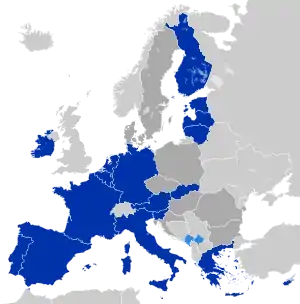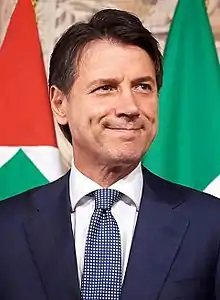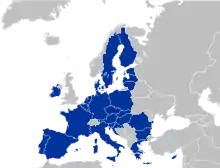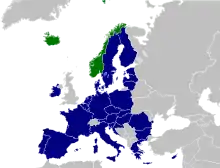Euro summit
The Euro summit (also referred to as the eurozone summit or euro area summit) is the meeting of the heads of state or government of the member states of the eurozone (those EU states which have adopted the euro). It is distinct from the EU summit held regularly by the European Council, the meeting of all EU leaders.
 |
|---|
| This article is part of a series on the politics and government of the European Union |
|
|
History
The Euro summit began as an offshoot of the Euro Group, which is the meeting of the eurozone member's finance ministers.[1] French President Nicolas Sarkozy called for the Euro summit to replace the Euro Group as a "clearly identified economic government" for the eurozone, stating it was not possible for the eurozone to continue without it. The eurozone economic government would discuss issues with the European Central Bank, which would remain independent.[2] Sarkozy stated that "only heads of state and government have the necessary democratic legitimacy" for the role. This idea was based on the meeting of eurozone leaders in 2008 who met to agree a co-ordinated eurozone response to the banking crisis.[3]
They first met in the summit format in October 2008, in response to the debt crisis. Subsequent meetings took place in March 2010, May 2010, March 2011, July 2011 and October 2011.[1] In the October 2011 meeting, it was agreed to formalise the Euro summit, as at least twice yearly meeting. This change was formalised in the 2012 Treaty on Stability, Coordination and Governance in the Economic and Monetary Union. Since this formalisation, Heads of State or Government have failed to meet this target of twice yearly meetings in 2013, 2014, 2016 and 2017.[4] A Euro summit President, separate from the Euro Group President, would be elected at the same time as the President of the European Council and under the same rules. Until such an election takes place, the European Council President fulfils that role.[5][6]
Meetings
In October 2011, the Eurozone head of states agreed to meet at least twice per year,[7] as part of measures to improve governance of the Eurozone. Meetings were chaired by president Herman Van Rompuy from March 2010[8] to November 2014. Donald Tusk has been the Euro Summit president since 1 December 2014, and ends his term on 31 May 2017.[9] The table below lists the date and summary reports of all previous Euro Summits.
| # | Euro summit dates[1] | Conclusions[10] | Press conference |
|---|---|---|---|
| 1 | 12 October 2008[11] | Launch of a bank crisis solution | |
| 2 | 25 March 2010[12] | Statement | |
| 3 | 7 May 2010[13] | Statement | Video |
| 4 | 11 March 2011[14] | Conclusions | Video |
| 5 | 21 July 2011[15] | Statement | Video |
| 6 | 23–26 October 2011[16] | Remarks by President, Statement |
Video: 1 and 2 |
| 7 | 9 December 2011[17] | Statement | |
| 8 | 30 January 2012[18] | Agreed lines of communication | |
| 9 | 2 March 2012[19] | Statement | |
| 10 | 29 June 2012[20] | Statement | Video |
| 11 | 14 March 2013[21] | New procedure rules for Euro summits, Remarks by President |
Video |
| 12 | 24 October 2014[22] | Statement | Video |
| 13 | 22 June 2015[23] | Extraordinary summit on Greece: Presidential Remarks | Video |
| 14 | 7 July 2015[24][25] | Website, Eurogroup meeting, Presidential Remarks | Video |
| 15 | 12 July 2015[26] | Website, Presidential Remarks, Statement | Video |
| 16 | 15 December 2017[27] | ||
| 17 | 23 March 2018 | Website | |
| 18 | 29 June 2018 | Website | |
| 19 | 18 October 2018 | Website | |
| 20 | 14 December 2018 | Website | |
| 21 | 21 June 2019 | Website | |
| 22 | 13 December 2019 | Website | |
New procedure rules for Euro summits were adopted on 14 March 2013,[28] regulating the Euro Summit shall meet at least twice a year, convened by its president on preferably one of the same dates as the EU summits.[29] However, for unknown reasons, only one Euro Summit meeting per year took place in 2013 and 2014, and none took place in 2016.
President
In its informal capacity, the de facto summit President has been the European Council President, meaning that Herman Van Rompuy chaired all meetings since March 2010 to December 2014. The proposals for formalisation of the summit include electing a President along the same lines (and term) as the European Council President,[30] and until then Van Rompuy continues to chair the summit. On 1 March 2012, according to the Treaty on Stability, Coordination and Governance in the Economic and Monetary Union (TSCG), he was formally elected as President of the Euro Summit for the term 1 June 2012 to 30 November 2014.[8] New president for the term 1 December 2014 until 31 May 2017, is the former Polish Prime Minister Donald Tusk.[9] Belgian Prime Minister Charles Michel was elected new president on 2 July 2019, taking office on 1 December 2019.[31]
Members

| Representative | Picture | Member State | In office since | |
|---|---|---|---|---|
| Sebastian Kurz | _(cropped).jpg.webp) |
7 January 2020 | ||
| Alexander De Croo | ._Arrivals_Alexander_De_Croo_(36766610160)_(cropped2).jpg.webp) |
1 October 2020 | ||
| Nicos Anastasiades |  |
28 February 2013 | ||
| Jüri Ratas |  |
23 November 2016 | ||
| Sanna Marin | .jpg.webp) |
10 December 2019 | ||
| Emmanuel Macron | .jpg.webp) |
14 May 2017 | ||
| Angela Merkel | _(cropped).jpg.webp) |
22 November 2005 | ||
| Kyriakos Mitsotakis | .jpg.webp) |
8 July 2019 | ||
| Micheál Martin | .jpg.webp) |
27 June 2020 | ||
| Giuseppe Conte |  |
1 June 2018 | ||
| Arturs Krišjānis Kariņš | 2.jpg.webp) |
23 January 2019 | ||
| Gitanas Nausėda |  |
12 July 2019 | ||
| Xavier Bettel |  |
4 December 2013 | ||
| Robert Abela |  |
13 January 2020 | ||
| Mark Rutte |  |
14 October 2010 | ||
| António Costa | .jpg.webp) |
26 November 2015 | ||
| Igor Matovič | .jpg.webp) |
21 March 2020 | ||
| Janez Janša |  |
13 March 2020 | ||
| Pedro Sánchez Pérez-Castejón |  |
2 June 2018 | ||
| Charles Michel Non-voting chair |
_(cropped).jpg.webp) |
1 December 2019 |
- Notes
Presidents of other EU institutions, such as the President of the European Commission and the European Central Bank President also attend. Presidents of the Euro Group and of the European Parliament may be invited and the President of the Euro Summit shall present a report to the European Parliament after each of the meetings of the Euro Summit. Heads of state or government of non-eurozone signatories to the European Fiscal Compact treaty participate, at least once a year, for those policies of the treaty that apply to them. In some summits, other leaders might attend discussions, for example the British Prime Minister attending the 2008 summit.
See also
| Wikisource has original text related to this article: |
References
- "History of the Euro Summit". European Council. Retrieved 18 December 2012.
- "Sarkozy pushes eurozone 'economic government' Archived 21 October 2012 at the Wayback Machine, France 24 (21 October 2008)
- Germany rejects idea of eurozone 'economic government': report, EU Business (21 October 2008)
- "Meeting Calendar". European Council. Retrieved 9 November 2018.
- Possible changes in the EU Treaty, European Council
- EU states to speed up austerity, embrace 'limited' treaty change, EU Observer
- http://www.consilium.europa.eu/european-council/pdf/Treaty-on-Stability-Coordination-and-Governance-TSCG/
- "Herman Van Rompuy re-elected president" (PDF). Council of the European Union. 1 March 2012. Retrieved 5 May 2013.
- "Special meeting of the European Council (30 August 2014): Conclusions" (PDF). European Council. 30 August 2014.
- "Council meeting conclusions". European Council. Archived from the original on 7 January 2015. Retrieved 15 September 2014.
- "Summit of the euro area countries – Declaration on a concerted European action plan of the euro area countries (12 October 2008)" (PDF). Council of the European Union. 12 October 2008. Retrieved 5 May 2013.
- "Statement by the heads of state and government of the euro area (25 March 2010)" (PDF). Council of the European Union. 25 March 2010. Retrieved 5 May 2013.
- "Statement of the heads of state or government of the euro area (7 May 2010)" (PDF). Council of the European Union. 7 May 2010. Retrieved 5 May 2013.
- "Conclusions of the heads of state or government of the euro area (11 March 2011)" (PDF). Council of the European Union. 11 March 2011. Retrieved 5 May 2013.
- "Statement by the heads of state or government of the euro area and EU institutions (21 July 2011)" (PDF). Council of the European Union. 21 July 2011. Retrieved 5 May 2013.
- "Remarks by President of the European Council Herman Van Rompuy following the meeting of the Euro Summit (26 October 2011)" (PDF). Council of the European Union. 27 October 2011. Retrieved 5 May 2013.
- "Statement by the Euro area Heads of State or Government (9 December 2011)" (PDF). Council of the European Union. 9 December 2011. Retrieved 5 May 2013.
- "Agreed lines of communication by euro area Member States (30 January 2012)" (PDF). Council of the European Union. 30 January 2012. Retrieved 5 May 2013.
- "Statement Euro area Heads of State or Government (2 March 2012)" (PDF). Council of the European Union. 2 March 2012. Retrieved 5 May 2013.
- "Euro area summit statement (29 June 2012)" (PDF). Council of the European Union. 29 October 2012. Retrieved 5 May 2013.
- "Eurozone summit family photo (14 March 2013)" (PDF). Council of the European Union. 15 March 2013. Retrieved 5 May 2013.
- "Euro Summit (24 October 2014) - Annotated Draft Agenda" (PDF). General Secretariat of the Council. 26 September 2014.
- "President Donald Tusk convenes a Euro Summit on Greece Monday 22 June at 19h00" (PDF). General Secretariat of the Council. 18 June 2015.
- "Invitation letter by President Donald Tusk to the Euro Summit" (PDF). General Secretariat of the Council. 6 July 2015.
- "Un sommet de la zone euro sur la Grèce se tiendra dès le 7 juillet". Le Monde (in French). 6 July 2015.
- "European Council meetings (calendar for future meetings)". European Council.
- "Non-euro states should take part in euro reform talks - EU's Tusk". Reuters.
- "Remarks by President Herman Van Rompuy following first session of the European Council" (PDF). European Council. 14 March 2013.
- "Rules for the organisation of the proceedings of the Euro Summits" (PDF). Council of the EU. 14 March 2013.
- "Euro summit statement (26 October 2011)" (PDF). Council of the European Union. 26 October 2011. Retrieved 5 May 2013.
- https://data.consilium.europa.eu/doc/document/ST-18-2019-INIT/en/pdf



